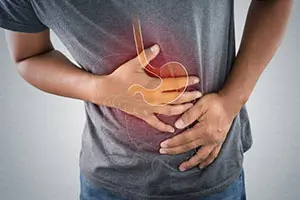
Just one more bite of that irresistible pani puri, one last jalebi, or a final slice of pizza. But that “just one more” often leads to complications: a night spent feeling queasy, severe stomach cramps, or even hours stuck in the restroom. This happens because, just as an overloaded machine malfunctions, so does our body when burdened with too much food.
Ayurveda’s Approach to Digestion
According to Ayurveda, our abdominal cavity is divided into four parts: two for solid food, one for liquids, and one for the three doshas (vata, pitta, and kapha). These doshas play an essential role in digestion, much like the space between seats in a train that allows people to move freely. When we overeat, this space for the doshas is reduced, leaving food undigested. Over time, this pattern of overeating can lead to chronic digestive issues.
The Impact of Food Quality on Digestion
It’s not only the quantity of food that affects digestion but also its quality. Heavy, sticky, cold, or dry foods like cheese, bread, eggs, and biscuits slow down the digestive process, much like a truck struggling to navigate a busy road. These heavier foods require more effort to digest, increasing the risk of digestive “traffic jams” in the system.
Mood and Mindfulness in Eating
Our emotional state while eating also impacts digestion. If we’re stressed, upset, or distracted, the food we eat isn’t fully processed. This lack of mindfulness can leave food stagnating in the digestive tract, where it can cause discomfort and even rotting.
The Habit of Eating Without Hunger
Unlike other animals, humans often eat when they aren’t truly hungry, usually because food is available or as a social activity. Whether it’s at a cafe or the movies, eating has become less about nutrition and more about social enjoyment. But when we eat without hunger, we’re putting unnecessary strain on our digestive system, known as jatharagni in Ayurveda. Each person has a unique digestive capacity, which varies based on the strength of their digestive fire. Eating only when hungry allows us to respect our body’s natural rhythm.
Overworking the Digestive Fire (Jathar Agni)
Regardless of how strong our agni (digestive fire) is, repeated overeating, eating heavy foods, or eating out of habit rather than need will eventually weaken it. Just as a machine overused without proper maintenance will break down, our digestive system will fail if we don’t respect its limits. This can lead to a variety of health issues rooted in poor digestion.
Remedies for Acute Digestive Problems

If you experience digestive issues like diarrhoea, vomiting, or bloating after overeating, it’s best to let the body clear itself out rather than stopping these symptoms immediately. Often, they’re the body’s way of expelling undigested material. Once the body has cleansed itself, avoid further strain by refraining from eating until the digestive system has settled. But if symptoms persist or there’s notable weakness should medication be considered, ideally under the guidance of an ayurvedic physician.
Tips for Long-Term Digestive Health
For those with regular digestive discomfort, small changes in daily habits can make a big difference. Here are a few foundational tips:
- Eat only when hungry: Avoid snacking or eating out of habit.
- Avoid heavy-to-digest foods: Steer clear of excessively rich or dense foods.
- Practice mindful eating: Don’t look at screens or talk excessively while eating.
- Eat on time: Delaying meals due to work or other commitments can impair digestion.
Ayurveda offers a vast wealth of knowledge on digestion and health. These basic practices can help you start on the path toward better digestive health and overall well-being.
